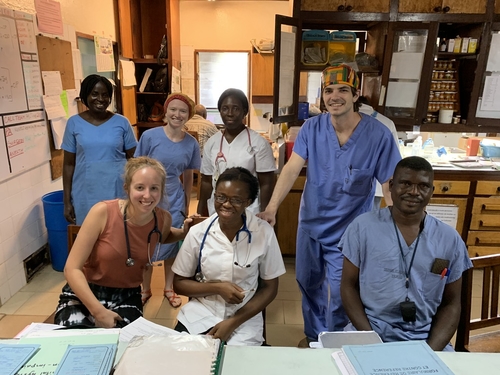
OUWB alum Theresa Timm left the U.S. to work in an African hospital early this summer, excited, yet unsure of what to expect — though what she experienced would prove life-changing.
Timm (nee Yankovich), OUWB Class of 2017, spent eight weeks at Hospital Baptiste Biblique in Adeta, Togo – a long, narrow country located in west Africa between Ghana and Benin.
She worked in the pediatric ward at the hospital located in a remote jungle community about three hours north of Togo’s capital city, Lome.
Part of a global health program through her residency (at St. Louis Children’s Hospital/Washington University in St. Louis), Timm said the experience was eye-opening, for many reasons.
“One of the biggest takeaways for me was (discovering the) enormous amount of work that needs to be done from both micro and macro levels in developing countries, and specifically in Togo,” she said.
“Various nongovernment organizations (NGOs) have done incredible work and have been able to do things such as provide free Coartem (malaria medication) for people with a positive test as well as HIV ARVs,” Timm said, adding “there are still lapses in these systems and there are still great needs for solutions to improving the delivery of medical care for these specific illnesses in vulnerable populations.”
The Togolese Republic, usually shortened to “Togo,” has a population of more than 8 million in its 22,000-square-foot area. Many languages are spoken in Togo with French being the official.
The economy is small — and Timm said she saw the impact every day at the hospital.
“Finding stable work is difficult for many, so poverty is rampant,” she said. “If you had a good job, an example wage was about $1 an hour.
“In the area where I was located, health care feels non-existent in many ways,” Timm continued. “Local government hospitals do not have a steady supply of medications. Families are required to pay upfront for all medical costs, which is not possible for a majority in this region. The probability of dying before the age of 5 is 10 times what it is in the U.S. Despite this, the people are resilient and do the absolute best with what they are given.”
Timm, originally from Northville, Michigan, was helping fill in at the hospital as the full-time pediatrician is taking a year off.
Her work was a stark contrast from the start of her medical studies, she said, when she didn’t have any interest in pediatrics. Then, on her last rotation, Timm had pediatrics and said she “fell in love with it.”
“There are so many interesting pathologies and frankly, most kids are pretty resilient,” she said. “I love babies, and I love high-acuity medicine.”
Today, Timm said, she is pursuing a fellowship in Pediatric Emergency Medicine after she finishes the forthcoming last year of her residency.
A primary reason is that she hopes to “maintain a broad set of clinical knowledge for further global health work.”
“One of the things that I appreciate about pediatrics is the social supports in place to help the most vulnerable — not perfect, by any means, but they are at least present in the U.S.,” Timm said.
Overcoming challenges
Timm spent her days at the 50-bed hospital undertaking many tasks: making rounds, managing inpatient wards, and working with surgeons for pre- and post-operative management, among other things. She said there were challenges.
“One of the biggest challenges on a personal level was learning to cope with the number of incredibly sick children and the number of pediatric deaths,” Timm said. “The hospital does not have the capability to ventilate a patient. And the only imaging available is X-Ray and ultrasound so understanding the cause of illness requires a good exam and a high degree of clinical suspicion.
“Additionally, transferring to another facility will many times be futile and not possible given the expense and limited medical capabilities at other hospitals,” she said. “I had a couple of deaths that were particularly devastating, so being able to talk through these with local staff was helpful.”
Rachel Yoskowitz, MPH, assistant professor, Department of Foundational Medical Studies, and director, global health, at OUWB, said the challenge of practicing in a low-resource setting is just one reason medical students and residents benefit from working outside the U.S.
Other reasons include: having to depend on basic clinical knowledge and skills to diagnose and treat (due to absence of high-tech equipment), gaining respect for the knowledge and ability of local health care providers, and seeing firsthand the importance of communication.
Applying her OUWB training
Timm said her time at OUWB was vital in helping her prepare.
“OUWB focused not only on training future physicians to excel academically, but they trained physicians to be kind,” she said. “Training in the Detroit area, medical students were exposed to widely diverse patient population, and we were taught to approach every patient with kindness, empathy, and understanding. I believe that these qualities have translated well to the global health setting.”
Timm pointed to Yoskowitz and Nathan Novtny, M.D., assistant professor, OUWB, and director of International Outreach for Beaumont Children’s and Beaumont Health, as helping spark and further her interest in global health.
Through their assistance as a student at OUWB, Timm spent time working in Uganda and Jordan and said she learned about the “joys and challenges” of caring for people around the world “and how to respectfully navigate through unfamiliar cultures.”
“It is gratifying to see that Dr. Timm is following her passion for global practice, a passion she began with her experience abroad as an OUWB student,” Yoskowitz said.

